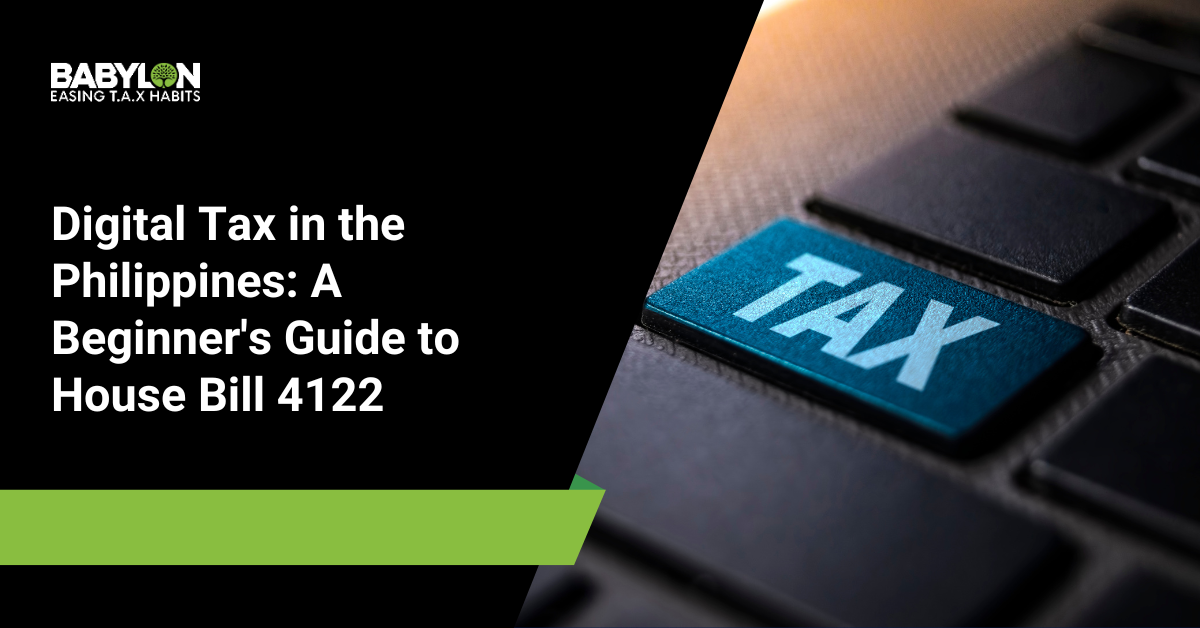As it goes, digital is the way of the future.
The Philippine digital market experienced a boom once everything went online. According to AlphaBeta, a Singaporean economic consultancy firm, the Philippines can potentially generate up to PHP 5 trillion in economic value through digital transformation by 2030.
This massive potential underscores the importance of robust digital infrastructure and favorable policies to maximize growth opportunities in the digital economy.
In line with this, House Bill 4122 proposes an amendment to the Philippine Tax Code to introduce a 12% value-added tax (VAT) on digital transactions. This bill aims to ensure that digital service providers, both local and foreign, are subject to VAT regulations, thereby creating a more equitable tax system and supporting the country’s economic transformation efforts.
Digital Technologies in the Philippines
The Philippines is rapidly embracing digital technologies, including blockchain and cryptocurrencies, alongside the growing reliance on digital services and online platforms.
Blockchain
Blockchain is a decentralized digital ledger technology where transactions are recorded securely across multiple computers. Each transaction is stored as a “block” linked in a chain, ensuring transparency and eliminating the need for a central authority.
Known for its immutability and cryptographic security, blockchain is used not only in cryptocurrencies but also in various industries for transparent asset tracking and secure data management, despite challenges like scalability and regulatory issues.
Cryptocurrency
Cryptocurrency is a digital form of currency secured by cryptography, operating on decentralized networks like blockchain. It enables secure and direct peer-to-peer transactions without intermediaries such as banks.
Currently, there are 48 registered cryptocurrency exchanges in the Philippines – 37 under the Cagayan Economic Zone Authority (CEZA) and 19 regulated by the Bangko Sentral ng Pilipinas (BSP). CEZA is currently developing the “Crypto Valley of Asia” in partnership with Northern Star Gaming and Resorts Inc.
Play-to-earn games like Axie Infinity, Age of Rust, and Illuvium have become widely popular avenues for earning cryptocurrency. Non-fungible tokens (NFTs), unique cryptographic tokens, are traded in games and digital art.
Digital Services and Online Platforms
Filipinos spend the most time online, making digital services a daily essential. Popular platforms like Google, Netflix, and YouTube are widely used, catering to various needs such as information, entertainment, and communication. These services highlight the country’s strong digital presence and growing reliance on online platforms.
As digital consumption continues to rise, there is an increasing demand for seamless connectivity and innovative online solutions in the Philippines.
The Impact of House Bill 4122 on Digital Transactions
House Bill 4122 has a large impact on digital markets, as it is poised to reshape regulatory landscapes, enhance consumer protection, and potentially foster innovation while ensuring fair competition among market players.
Increased Regulation
House Bill 4122 introduces stricter rules for digital markets to improve consumer protection and transparency. Platforms must disclose more about their practices and pricing to promote fair competition and deter monopolies.
These new rules may increase scrutiny and compliance costs for digital platforms. Companies might need to adapt their business strategies and operations to comply with these requirements, which could impact their profitability and how the market functions overall.
Consumer Trust and Confidence
The bill’s focus on transparency and fairness is expected to increase trust among consumers in digital markets. Clearer information about data usage and transaction processes may enhance confidence in online commerce and digital services.
This trust can also help businesses by lowering customer turnover and building stronger loyalty. Companies that prioritize transparency and adhere to the new regulations may gain a competitive advantage in attracting and retaining customers.
Innovation and Market Entry
Despite initial challenges, stricter regulations could drive innovation in digital markets. New and existing companies might innovate to meet regulations more efficiently or create new services that meet consumer protection standards.
The emphasis on fair competition could create openings for smaller businesses to enter the market. Larger platforms may adjust their practices to comply with anti-monopoly measures, potentially fostering a more diverse and competitive digital marketplace in the long run.
How Digital Markets Affects Accounting
As businesses increasingly adopt e-commerce and digital transactions, accountants must adapt to new complexities and integrate various platforms with accounting software. The change necessitates upskilling and providing value-added services beyond traditional bookkeeping.
E-Commerce and Digital Transactions
The growth of e-commerce has introduced new complexities in accounting practices. Accountants must now handle high-volume transactions and integrate various e-commerce platforms with accounting software. This shift requires upskilling in cloud accounting software, migrating from traditional systems, and providing insights into e-commerce strategies and consumer behavior.
Adoption of Cloud Computing
Cloud computing has revolutionized accounting by enabling real-time data access, improving collaboration, and reducing the risk of data loss. It allows for the automation of many accounting tasks, reducing manual data entry and minimizing errors. Firms can easily scale their operations and manage larger client bases by leveraging cloud technology.
Artificial Intelligence (AI) Integration
AI is transforming the accounting profession by automating repetitive tasks and providing deeper insights through data analysis. It automates tasks such as data entry, reconciliation, and payroll processing, allowing accountants to focus on more strategic activities. Accountants must learn to use AI-powered tools and understand their implications to stay competitive.
Virtual Accounting and Remote Work
The transition to remote work and virtual accounting has been accelerated by the COVID-19 pandemic. It has led to increased flexibility, allowing accountants to work from anywhere and provide services to clients globally. However, there is a heightened need for robust cybersecurity measures to protect sensitive financial information.
Regulatory Changes and Compliance
Digital markets have prompted updates in regulatory frameworks to address new business models and technologies. Accountants must stay informed about these changes to ensure compliance. The treatment of digital assets like cryptocurrencies is evolving, requiring accountants to understand new tax implications and reporting requirements.
If you’re looking for expert guidance to navigate these changes, consider signing up as a client with Babylon2k.
Digital Taxation in the Philippines
The digital economy has introduced new tax challenges and possibilities for businesses and individuals in the Philippines. In this section, we’ll dive into the tax implications of cryptocurrencies, digital services provided by foreign companies, and the essential tax compliance requirements for businesses operating in the digital space.
Cryptocurrencies
The Department of Finance (DOF) aims to provide clear tax guidelines for virtual currencies by 2024. As of now, the Bureau of Internal Revenue (BIR) urges taxpayers to declare their income from these digital assets.
According to DOF Undersecretary Antonette Tionko, cryptocurrency is considered an asset and is therefore subject to income tax. “If you earn money from it, it’s income. You should report it,” she emphasized. It’s unlikely that cryptocurrency will be treated as “fiat” currency in the Philippines anytime soon, and more research is needed to establish specific rules for taxing cryptocurrency. Currently, taxation applies when cryptocurrency is converted to “fiat” currency.
Digital Services Abroad
The Bureau of Internal Revenue (BIR) assesses deficiency taxes on income payments made by local companies to non-resident foreign corporations (NRFC), especially tech giants, due to alleged non-withholding of final tax. The withholding agents are held accountable for not withholding taxes from NRFCs.
However, implementing these measures is challenging as NRFCs operate through digital platforms. These payments are subject to a 25% final withholding tax and a 12% final withholding value-added tax. To offset the additional taxes, local companies and NRFCs can apply for tax treaty benefits, with guidelines streamlined by RMO 14-2021.
Summary of Required Tax Compliance
To ensure compliance with tax regulations, businesses operating in the digital economy must adhere to the following:
- Registration and Updates
- Maintaining Books of Accounts
- Submitting Tax Returns and Paying Taxes
- Withholding Obligations (if applicable)
Tax Penalties
Taxpayers who try to avoid filing tax returns or making tax payments face criminal liability under Sections 254 and 255, in relation to Section 248(8) of the NIRC:
- SEC. 254, Attempt to Evade or Defeat Tax: Punishable by a fine ranging from five-hundred thousand (PHP 500,000) to ten million (PHP 10,000,000) and imprisonment of six to ten years; provided that the conviction or acquittal obtained shall not prevent the filing of a civil suit for tax collection.
- SEC. 255. Failure to File Return, Supply Correct and Accurate Information, Pay Tax Withhold and Remit Tax and Refund Excess Taxes Withheld on Compensation: Punishable by a fine of not less than ten thousand (PHP 10,000) and imprisonment of one year to ten years.
To avoid being liable for tax evasion and a civil penalty of 50% of the tax or deficiency tax, it’s crucial to practice necessary tax compliance.
Get Expert Help with Digital Taxation
The digital economy has brought about new challenges and opportunities in taxation for businesses and individuals in the Philippines. By staying informed about the tax implications of cryptocurrencies, digital services abroad, and the required tax compliance, you can navigate the complexities of the digital economy and avoid potential penalties.
At Babylon2k, we offer comprehensive tax services and consultation services to help you stay compliant with the latest digital tax regulations. Our team of experienced professionals can guide you through the intricacies of digital taxation and help you optimize your tax strategy.
Sign up as a client and request a quote today and take the first step towards ensuring your business is prepared for the future of digital taxation in the Philippines.
If you have more questions, do not hesitate to message our AI chatbot or contact us at [email protected]. You can also reach us through Viber/WhatsApp at +63-927-945-3382.






